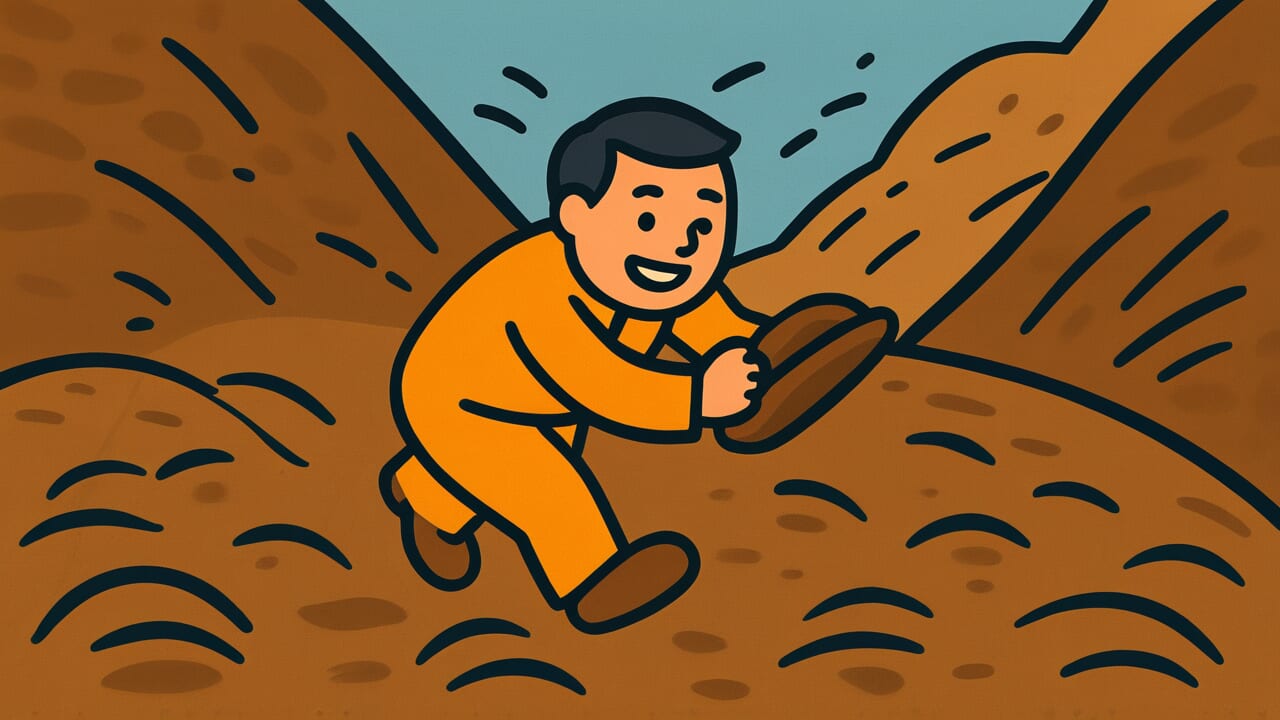How to Read “Grab the soil where you fall”
Taoruru tokoro ni tsuchi wo tsukamu
Meaning of “Grab the soil where you fall”
“Grab the soil where you fall” is a proverb that describes human nature when facing trouble. People instinctively try to grab onto anything they can.
When you’re about to fall, you reflexively reach out to grab something. If there’s nothing to hold onto, you’ll even try to grip the soil on the ground.
This image shows how desperate people become when cornered. They’ll cling to anything in front of them without thinking whether it will actually help.
This proverb is used when someone in dire straits grasps at unreliable things. It also describes people who’ve lost their composure and make futile efforts.
Even today, this expression accurately captures the instinctive behavior patterns humans show when facing a crisis.
Origin and Etymology
No clear written records explain the origin of this proverb. However, we can make interesting observations from how the phrase is constructed.
“Taoruru” is classical Japanese meaning “to fall.” “Tsuchi wo tsukamu” literally means gripping the soil on the ground.
The image emerges clearly: when someone falls, they reflexively reach out to grab something. The soil on the ground becomes their last resort.
Japanese daily life deeply influenced how this expression was born. In old Japan, dirt ground was everywhere. Grabbing soil when falling was a common experience.
This concrete physical experience became a metaphor for human desperation in difficult times.
The choice of soil carries deep meaning. Soil is the most basic element, found everywhere. Even when nothing else remains to rely on, people still try to grab something.
The proverb’s essence lies in expressing this desperate human condition through the concrete action of grabbing soil.
Usage Examples
- After his business failed, he grabbed the soil where you fall and jumped at a suspicious investment scheme
- Hearing it might cure his illness, he’s grabbing the soil where you fall by trying even folk remedies
Universal Wisdom
“Grab the soil where you fall” reflects the most primitive aspect of human survival instinct. Why has this expression been passed down through generations?
Because human behavior when cornered never changes, regardless of the era.
When calm, everyone can make rational decisions. But when truly desperate, instinct moves before reason. There’s a saying about drowning people grabbing at straws.
But “grabbing soil” is even more desperate. Straw might have some buoyancy. Soil offers no help at all. Yet people still try to grab it.
There’s no calculation or ulterior motive here. Only the pure desire to “cling to something” exists.
Our ancestors neither condemned nor praised this human trait. They simply observed it and put it into words. This wisdom comes from deep understanding of humanity.
Everyone has weakness. When cornered, everyone tries to grab something even knowing it’s meaningless. Accepting this fact becomes the first step toward understanding humanity.
This proverb contains a warm gaze that looks directly at human weakness.
When AI Hears This
When humans start to fall, their hands automatically reach out to grab something. This happens through a neural circuit called a reflex arc that bypasses the brain.
The signal just loops back at the spinal cord. Response time is only about 50 milliseconds. Compare this to 200 milliseconds when the brain thinks first. That’s four times faster.
“Hands move before thinking” is evolution’s optimal solution for increasing survival probability.
What’s interesting is that this reflex doesn’t judge whether something is actually grabbable. Whether it’s air or soil, the hand reaches out and tries to grab.
Biologically, this is an extremely rational strategy. Even if the probability of grabbing nothing is 90 percent, if there’s a 10 percent chance of reducing fall damage, the near-zero energy cost of “reaching out” makes it worth doing.
The essence of this proverb lies precisely in this probabilistic judgment. Grabbing soil might not prevent the fall. But not grabbing keeps the possibility at zero.
Over hundreds of millions of years, biological nervous systems have built into the body this calculation: “low probability plus is better than zero.”
Humans taking action even in hopeless situations isn’t about willpower. It’s basic biological design.
Lessons for Today
This proverb teaches modern people the importance of knowing human weakness. We usually think we can make calm, rational judgments.
But when truly cornered, anyone might grab the soil where you fall.
That’s why prevention matters. Before becoming desperate, have trustworthy people to consult. Before judgment gets clouded, prepare multiple options.
Most importantly, have the humility to admit you’re a weak being.
If you see someone clinging to something meaningless, don’t laugh at them. It’s human instinct. Tomorrow, you might be in their position.
Conversely, if you find yourself grabbing the soil where you fall, have the courage to pause. Take a deep breath. Look for a hand that will truly help.
Knowing human weakness is the first step toward strength.



Comments